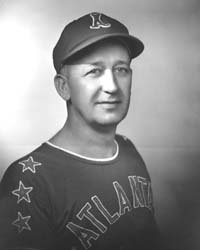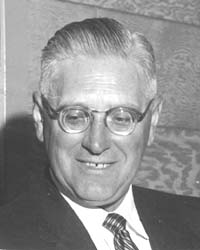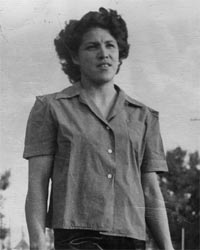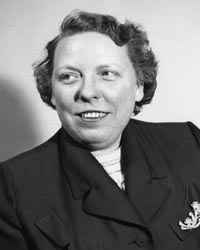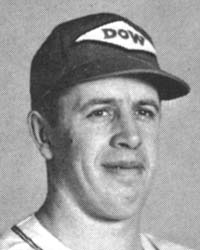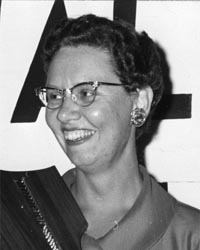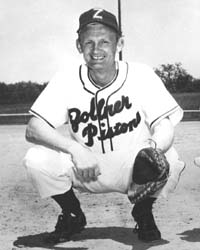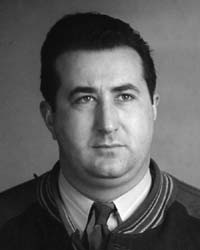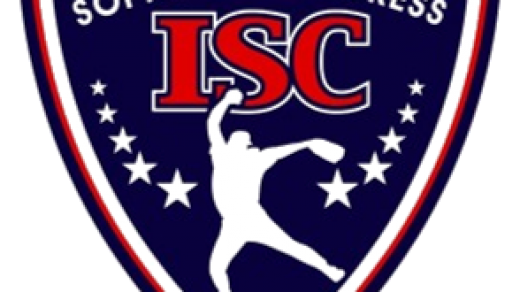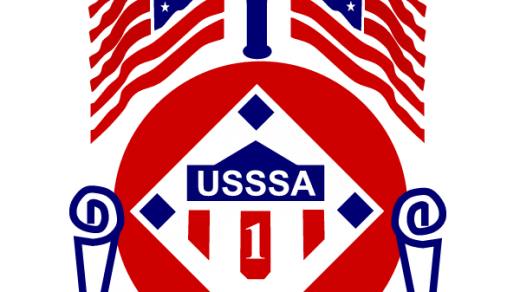The National Softball Hall of Fame is the ultimate goal for any player, coach, umpire or administrator who aspire to greatness in the sport. With over 400 inductees, the National Softball Hall of Fame is among the most difficult sports halls in the nation in which to gain membership.
Take a moment to browse through the Hall of Fame section and learn more about some of the sport’s greatest athletes and their accomplishments. If you get a chance to visit us in person while in Oklahoma City, please observe these hours of operation:
The Hall of Fame and Museum does not charge, but donations are greatly appreciated and accepted. Your donations help keep this history of softball alive through exhibit updates, upkeep and restoration projects.
Link to Video of the National Softball Hall of Fame
The National Softball Hall of Fame and Museum was established in 1957. Once USA Softball moved to Oklahoma City January 1, 1966 after having its offices in Newark, NJ, the decision to establish a Hall of Fame Building in Oklahoma City was made in January of 1965. Groundbreaking ceremonies for the Hall of Fame were held December 19, 1970 in Oklahoma City. The late John Nagy, former Cleveland Metro commissioner, was USA Softball President at that time. Hall of Famers Harold (Shifty) Gears and Carolyn Thome Hart were among those attending the ceremonies.
The National Softball Hall of Fame was officially dedicated May 26, 1973 in Oklahoma City. The building was opened to the public July 1, 1973.
The first of two additions to the National Softball Hall of Fame/USA Softball Headquarters was started July 5, 1976 and completed July 13, 1977 for an additional 4,350 square feet of space. Dedication ceremonies for the expansion were held July 23, 1977. Counting the National Softball Hall of Fame/USA Softball Headquarters and the USA Softball Hall of Fame Complex, there is 28,406 square feet of space.
A second expansion was added July of 1980 for an additional 5,182 square feet of space, with total footage 18,140 square feet of space.
The National Softball Hall of Fame and Museum has over 400 members with two categories of membership: players and non players. Within the player category, there are five categories: Men’s/Women’s Fast Pitch, Men’s/Women’s Slow Pitch and Modified Pitch. Within the non player category, there are five different divisions one can be nominated in: Commissioner, Meritorious Service, Umpire, Managers and Sponsors. A nominee needs 75 percent (nine votes) of the votes cast by the 12 member Hall of Fame Committee to be elected. Annual inductions are held at the USA Softball Annual Meeting.
Through our vast collection of artifacts, the National Softball Hall of Fame and Museum strives to educate the public about softball’s rich history. Your support is critical to these efforts.
The Hall of Fame Donation Fund was established to ensure that the National Softball Hall of Fame has a future and is committed to educating people about the great former players and non players and the role they played in the development of the sport.
Your tax-deductible contribution helps the National Softball Hall of Fame continue its mission of educating, collecting and honoring as well as the preservation of the history of softball, the maintaining of present exhibits and purchase of new exhibits and possible expansion of the Hall of Fame building.
Due to the volume of offers we receive, we cannot accept the donation of an artifact without a completed artifact description form. Please see our Mission Statement and Collections Management Policy to see what types of objects we will and will not accept. Once we have received your form, our staff will evaluate the object’s potential and will be in contact with you as to whether or not we will be able to accept the donation. If your object is chosen, the donated material will be recommended to the Executive Director for consideration. Following the meeting a staff member will contact you regarding the next steps.
![]() Click here for the Donor Questionnaire Form
Click here for the Donor Questionnaire Form
- National Softball Hall of Fame 1950’s
- National Softball Hall of Fame 1960’s
- National Softball Hall of Fame 1970’s
- National Softball Hall of Fame 1980’s
- National Softball Hall of Fame 1990’s
- National Softball Hall of Fame 2000’s
- National Softball Hall of Fame 2010’s
NATIONAL SOFTBAL HALL OF FAME CLASS OF 1957
Sam Elliott, Atlanta, Georgia – Men’s Fast Pitch – Pitcher
The first softball player inducted into the Georgia Hall of Fame, (1977), Sam “Sambo” Elliott started his career as a catcher and eventually decided he liked pitching better. Between 1934-1953, Ellliott averaged 12. 3 strikeouts per games, striking out 13,936 batters as he won 1,046 games and lost 87. He hurled 107 no-hitters. The first game Elliott ever pitched was a no-hitter and Elliott said that was one of the greatest thrills of his career. The others were being on a state championship team his first year and being one of the first people elected to the National Softball Hall of Fame in 1957. Although never a member of a national championship team, Elliott said, “There were so many great days than bad ones.” Elliott, who was inspired by another softball great, Paul (Windmill) Watson, played for numerous teams, including Knowles Electric, Sterchi’s, Sports Arena, Georgia Crackers, Brooks-Shatterly, Trammell Scott and Baily Supreme. Elliott retired from Western Electric in 1972 and passed away July 23, 1984. He was born August 23, 1911.
Harold “Shifty” Gears, Rochester – New York, Men’s Fast Pitch – Pitcher
Some people think Harold “Shifty” Gears, the first inductee into the National Softball Hall of Fame, got his name because he could pitch a softball with either hand. Not true. Gears got his nickname because of his shifty footwork playing basketball growing up in his hometown of Rochester, NY. Gears started pitching a softball out of apathy because his teammates didn’t want to pitch and Gears was tired of his team getting beat badly. “When I saw the opposing team’s pitcher throw a rise ball I went home and worked on it,” said Gears. “I got so I could pitch and conked my catcher in the nose a couple of times and wound up as our pitcher.” Gears played softball five nights a week and baseball on Saturday and Sunday. Eventually he gave up baseball and concentrated on softball. In national championship play, Gears had a 20-6 record and finished his career with 866 wins and 115 losses. He hurled 61 no-hitters, nine perfect games, 373 shutouts and struck out 13,244 batters, averaging 13.5 strikeouts per game during his career. He retired as a player in 1951 and died November 18, 1974 at age 67. He was the first player elected to the ASA Hall of Fame. Gears passed away November 18, 1974 at 67 after suffering a heart attack. He was the first player elected to the Hall of Fame.
Amy Peralta May, Tempe, Arizona – Women’s Fast Pitch – Pitcher
Amy Peralta May not only was a talented pitcher but she also was an excellent hitter who often batted clean-up for the renowned Phoenix Ramblers, one of softball’s all-time great teams. May was a member of three Rambler national championship teams, 1940, 1948 and 1949, and batted .577 in the 1945 national championship. She played 17 years of her 20 year career with the Ramblers, compiling a 447-79 record with 300 shutouts. Her overall record was 670 wins and 150 losses with 20 no-hitters and 80 one-hitters. She earned All-America honors six times and in the 1948 ASA national championship compiled a 5-1 pitching record with 25 strikeouts in 42 innings, allowing only 12 hits. She also batted .304 and had five RBIs in the championship. She finished the year with 55 wins. In the 1949 ASA national championship, she was unbeaten (3-0), striking out 14 batters and finishing the season 56-10. In the 1950 national, she won three of five games and struck out 20. May credited her team for her success. “I was a good pitcher because I had a good team behind me. Without them and our coach, Ford Hoffman, I would have never been the pitcher that I was.” Amy died in 1985.
M. Marie Wadlow, Peoria, Illinois – Women’s Fast Pitch – Pitcher
The first female inductee into the National Softball Hall of Fame, M. Marie Wadlow compiled a pitching record of 341 wins and 52 defeats between 1929 and 1950. In seven years with the Caterpillar Dieselettes of Peoria, IL Wadlow compiled a record of 107 wins and only 18 losses. Former manager Chuck McCord called Marie “one of the greatest competitors I’ve seen anywhere.”Growing up playing softball on the sandlots of St. Louis, Wadlow said her greatest thrill in softball came in the 1950 ASA national championship. She had a 2-2 record in the tourney, striking out 26 batters. “We had a 17-inning 1-0 loss to the Phoenix Ramblers, giving us third place in the national tourney at San Antonio,” said Marie. “The thrill was watching the Ramblers come back in the evening after that more than three-hour struggle in the intense heat of the afternoon. We had about two hours rest, then beat the undefeated Orange Lionettes 1-0 in 11 innings. We then took a half hour rest, then lost a heart-breaking 15 inning game to Orange, 3-1, for the championship. “It was 43 innings in about 11 hours,” continued Wadlow. “ Bertha (Ragan) Tickey pitched 26 innings in the last two games for Orange. She was knocked to the ground by a vicious line drive in one of the games, only to get up and finish the game and the tournament.”Wadlow retired from the Caterpillar Tractor Company in February of 1977. She also is a member of three other Halls of Fame.Wadlow passed away April 6th, 1979 at age 61.
NATIONAL SOFTBAL HALL OF FAME CLASS OF 1958
Al Linde, Milwaukee, Wisconsin – Men’s Fast Pitch – Pitcher
Linde was double-trouble to softball teams. Not only could he beat an opponent on the mound but at-bat as well. Linde has the distinction of being a member of five ASA national championship teams: the Ke-Nash-A’s of Kenosha, WI (1934), Deep Rock Oilers, Tulsa, OK (1942), Hammer Field Raiders, Fresno, CA (1943-44) and Dow AC’s, Midland, MI (1951). Linde started his career in 1930 hurling for the Ke-Nash-A’s (61-8) and as a teenager combined with Bill Penick (2-0) and Harry Kraft (1-0) to lead the team to the national title. In the national tourney, Linde allowed only one run and four hits in winning two games, fanning 36. He also batted .400. Between 1935-1938, Linde starred for teams in Iowa, including Schukei Motors of Waterloo (1935-36), the Boone Nitehawks (1937) and Iowa Packing (1938) before playing for the Phoenix Lettuce Kings (1939), Deep Rock Oilers and the Hammer Field Raiders. After a stint in the service, Linde finished his career with the Dow AC’s and in eight years (1946-1953) won 119 games and lost only 39. He helped Dow win the 1951 ASA national title batting .393 (11-for-28) and earning the first of his two All-America selections. Two years later he was again named an All-American outfielder, batting .357 in the national tourney. It is estimated that in his career Linde hurled 120 no-hitters, 25 perfect games and struck out more than 15,000 batters. On April 29, 1991, Linde passed away at age 76.
NATIONAL SOFTBAL HALL OF FAME CLASS OF 1959
Betty Evans Grayson, Portland, Oregon – Women’s Fast Pitch – Pitcher
Although she started her softball career as an outfielder, it would be as a pitcher that would eventually lead Betty Evans Grayson into the ASA National Softball Hall of Fame. She started as an outfielder in the Portland City League and by 13 had pitched a little in grade school. Her manager, Erv Lind, however, felt Betty could become a great pitcher. So with the help of Betty’s father, Raymond Evans, and two former pitchers, Eddie Jossi and Archie “Windmill” Hamlin, Betty pitched and pitched. Betty played in the outfield for the Florists the summer of 1940. That would be her last year in the outfield. At the end of the season, Erv told Betty, “From now on you’re going to be throwing for us.” Named all-city in 1941 and 1942, Betty pitched in her first of six ASA nationals championships in 1943. In 1944, she hurled the Lind and Pomeroy team to the ASA national title. She also was named as Oregon Woman Athlete of the Year by the Oregon Sportswriters and Broadcasters Association. She compiled a 456-99 record with 51 no-hitters and three perfect games. Betty died July 7, 1979 at age 53, a victim of cancer.
Bernie Kampschmidt – Covington, Kentucky, Men’s Fast Pitch – Catcher
Fort Wayne, IN Zollner Piston sponsor Fred Zollner knew a good thing or a good ball player. So when his Pistons were defeated 1-0 in 1940 on a one-hitter by pitcher Leo Luken and catcher Bernie Kampschmidt, Zollner asked the two players to join the team. The 5-foot-11, 180-pound Kampschmidt wasn’t a stranger to national championship teams. In 1939, he played for the national champion Nick Carr Boosters of Covington, KY. But with the Pistons, he would play with a team comprised of the best players in the United States who won three consecutive national titles (1945-1947). Kampschmidt was named manager of the team in 1946 and held that position until the team disbanded in 1954. He was named to the all-star team of the National Fastball League four years in a row, 1946-1949. He called his greatest thrill in softball “winning the 1939 championship in Chicago with all the players being from Covington, KY, a town of eight thousand population.” Nicknamed Whitey, Kampschmidt had a rifle arm and was an excellent receiver who played softball 31 years starting in Covington, KY. After the Pistons disbanded, Kampschmidt remained with the company and had a 42 year career before retiring in 1982. He was born September 11, 1916 and died February 23, 1996 at age 79.
Clyde “Dizzy” Kirkendall, Findlay, Ohio – Men’s Fast Pitch – Pitcher
A member of five national championship fast pitch teams, Kirkendall compiled a record of 1,144 wins and 52 losses during his fast pitch career (1932-1953) playing for ten different teams. He hurled 167 no-hitters. Kirkendall’s championships included three with the Fort Wayne Zollner Pistons, 1945-1947, and one each with the Crimson Coach Tobaccos, Toledo, OH (1935) and Pohlar’s Cafe, Cincinnati, OH (1938). In one game he hurled 33 innings, allowed three hits and walked one while striking out 67. With Fort Wayne, Kirkendall compiled a 4-1 record in ASA national championship play and was 108-16 overall. He was 21-4 in 1948 with 215 strikeouts and only 37 walks and was 28-4 in 1947. In 1940, he had a 68-4 pitching record followed by a 51-3 record the next year. Dizzy, 6-feet tall and 195 pounds, suffered a heart attack in 1953 pitching for Cooper Tire and Rubber Company of Findlay, OH. He suffered two more heart attacks before passing away November 11, 1957 at 42. He was born August 21, 1915.

